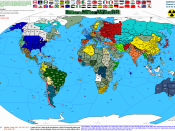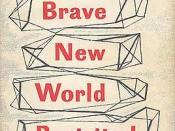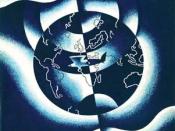In the worlds of the narrative text Brave New World (1932), composed by Aldous Huxley and the visual text Blade Runner (Director's Cut) (1992), directed by Ridley Scott, perhaps the most significant thematic concern is that of the intervention into the natural order by elitist human forces. Responders are confronted with stark, forlorn visions of a future that has alienated the natural environment from humanity, creating a society of moral destitution, in which its inhabitants are substantially lacking as human beings. 'Humanity' in these worlds is governed by loss, loss of the 'natural', and loss of spirituality. It is man's obstruction of the natural order, through genetics, that formulate the underpinning conflicts within these two texts.
The imagery established in Brave New World, "a squat gray building of only thirty- four stories high" present us with a society that has built upwards. This synthetic 'World State' operates on a level that usurps divine prerogative of creation through a process of genetic selectivity, social conditioning, and the cultural eradication of Christian and other values - replaced with the philosophies of Henry Ford.
The mass productions of humans, and their conditioning results in the suppression of natural human emotions, illustrated by the hypnopaedic teaching reiterated by Lenina, 'when the individual feels, the community reels.' The New World Utopia of Huxley's text appears to provide its inhabitants with a supremely comfortable existence, with every need anticipated and fulfilled; this, however, comes with a price. The World State motto "Community, Identity, Stability" underscores the notion that the solidity of the society overrides individual contentment, depriving them of essential humanity. Lower castes in Brave New World are indoctrinated to hate nature so they remain happy to be incarcerated in the factories doing the work their predetermined social status requires of them. "A love of...


